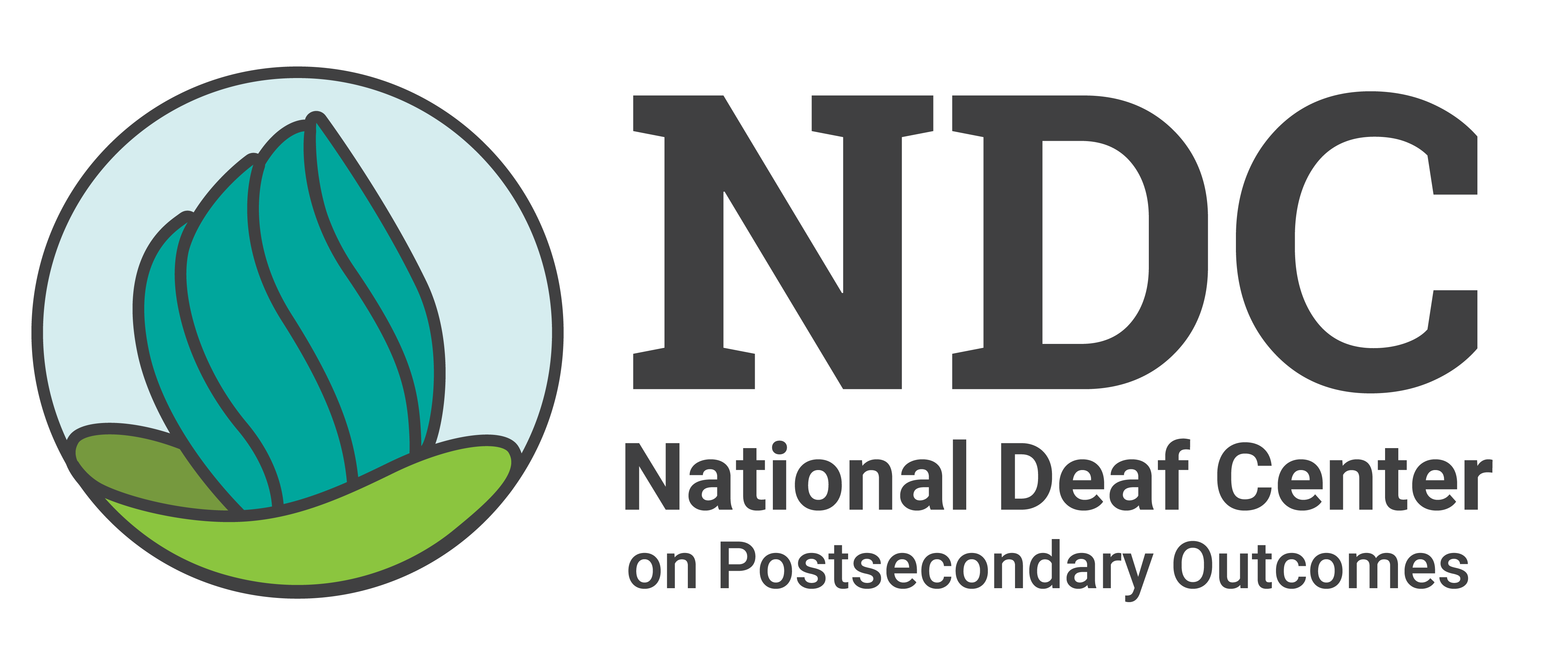The National Deaf Center is using the term deaf in an all-inclusive manner, to include people who may identify as deaf, deafblind, deafdisabled, hard of hearing, late-deafened, and hearing impaired. NDC recognizes that for many individuals, identity is fluid and can change over time or with setting. NDC has chosen to use one term, deaf, with the goal of recognizing experiences that are shared by all members of our diverse communities while also honoring all of our differences.
Agenda
 17 October, 2023 10:00 am
17 October, 2023 10:00 am
Opening Remarks
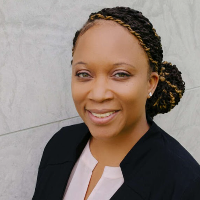
Tia Ivanko
(she/her)
Tia Ivanko, M.S.,NIC, ADAC, the Co-Director and Co-principal investigator at the National Deaf Center on Postsecondary Outcomes, is committed to improving systems and increasing the professional capacity of people and entities who provide services for deaf communities. As a certified ADA Coordinator (ADAC), and nationally certified interpreter (NIC), she brings a deep knowledge of accessibility and professional practices from the interpreting field to the technical assistance work. Ivanko is passionate about addressing inequities in education for deaf learners, she is an experienced trainer and mentor to professionals working in education settings. She is particularly interested in increasing opportunities and representation of Black and Brown professionals in fields serving deaf communities.
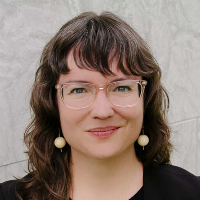
Carrie Lou Bloom (she/her)
Carrie Lou Bloom, PhD, is an Assistant Professor of Practice in the Department of Educational Leadership and Policy at the University of Texas at Austin. She co-directs the National Deaf Center on Postsecondary Outcomes. Dr. Bloom holds masters' degrees in Deaf Studies and Deaf Education, and Program Evaluation, and a PhD in Educational Psychology. Her research focuses on the psychological factors involved with transition, and strategies for mitigating systemic disparities that impact deaf communities. Her work seeks to counter commonly held narratives about deaf people that are built on a deficit perspective. Dr. Bloom advocates for examining the deficits within systems, then changing the systems — not the people.
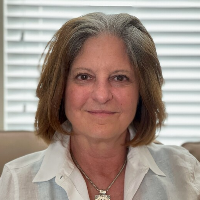
Louise Tripoli
 17 October, 2023 10:30 am
17 October, 2023 10:30 am
Culturally Responsive Services: Creating Meaningful Working Relationships
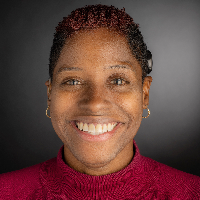
Alesia Allen (she/her/hers)
Alesia Allen, Ph.D., is Assistant Vice President (AVP) of Diversity and Inclusion at National Technical Institute for the Deaf (NTID) at Rochester Institute of Technology (RIT). In this role, she monitors diversity, inclusion, equal opportunity and access regulations and issues in higher education and advises the president and other NTID administrators on matters related to diversity and inclusion. She also ensures accessibility and inclusive collaboration while bridging gaps between NTID and university-wide initiatives at RIT. Dr. Allen has more than 15 years of professional, clinical, and teaching experience and she worked on several initiatives to promote system changes that impact deaf and hard-of-hearing individuals who come from diverse backgrounds. Dr. Allen holds a doctoral and a master’s degree in clinical psychology from Gallaudet University and a bachelor’s in psychology from RIT.
Culturally-responsive approaches to providing services are important. Service providers who practice cultural humility allow for greater understanding and recognize each individual’s unique cultural experiences. A review of concepts connected with intersectionality, integrating a multicultural orientation framework, and embracing skills to practice cultural humility will be shared in hopes to create meaningful working relationships.
 17 October, 2023 11:30 am
17 October, 2023 11:30 am
Identifying Alternative Avenues for Accessibility Concerns
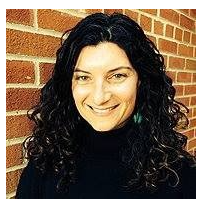
Elizabeth Stone (she/her)
Elizabeth “Liz” Stone, is a University Ombuds since 2015 and the current director of Ombuds Programs at Gallaudet University providing confidential, informal, independent, and impartial conflict management resources. Stone is a certified professional diversity coach trained with the Coach Diversity Institute and a conflict management practitioner with 20+ years of experience in higher education, nonprofit, and government-affiliated settings. Stone earned her bachelor’s in social work, master’s in public administration, and holds several certificates in mediation, racial justice facilitation, and restorative justice.
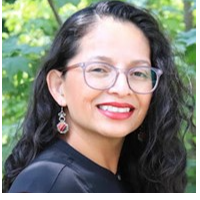
Norman Morán (she/ella)
Norma Morán, Associate Ombuds at Gallaudet University, is responsible for undergraduate and graduate student visits, conflict resolution and competence training, and data visualization/management. Ms. Morán is an appointed member of the Maryland Advisory Council of the Deaf and Hard of Hearing and a board member of the Maryland/Washington DC Chapter of Hands and Voices. She has a bachelor’s in Professional Technical Communication and a master’s in International Education and Training. In addition, she earned certificates in diversity, equity, and inclusion; restorative justice; racial justice facilitation; and mediation.
In this presentation, we will discuss general campus resources and how those can be leveraged in establishing a culture of accessibility on your campus. Having a culture of accessibility on campus is crucial as it plays a pivotal role in building and fostering a sense of belonging for deaf students.
 17 October, 2023 11:30 am
17 October, 2023 11:30 am
Creating a Centralized Communication Access Services System
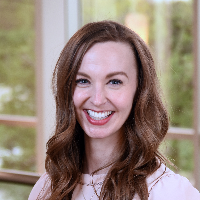
Katherine W. Vance, MS, NIC, SC:L, CPACC (she/her)
Katherine Vance is a certified ASL/English interpreter and accessibility professional with over 15 years of experience in communication and digital accessibility. She’s worked to mobilize enterprise-level strategies to improve accessibility and inclusion for members at all levels of organizations. Katherine spent ten years at the University of Cincinnati working in disability services, overseeing ASL/English interpreting, speech-to-text, closed captioning, and digital format services. In March 2023, Katherine joined Fidelity Investments as the Accessibility Director in the Global Diversity & Inclusion Office, overseeing the firm’s efforts to improve the digital accessibility of associate-facing applications.
This presentation will explore options for colleges to establish a centralized operational model for the provision of interpreting and speech-to-text services . Colleges have long operated these service lines in a decentralized capacity, which has generated barriers to access for deaf people; duplicated efforts and resources; created legal ramifications due to lack of expertise; and created service inefficiencies. The adoption of centralized operations builds capacity for sustainability and leads to increased business efficiencies, reduced barriers for deaf members, and increased campus-wide access to programming and events. This presentation will review strategies to propose and implement a centralized operational model.
 17 October, 2023 01:00 pm
17 October, 2023 01:00 pm
Study Abroad - Rights Abridged
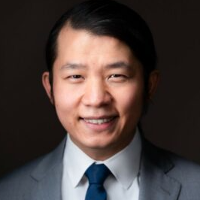
Drake Darrah (he/him)
Drake Darrah is an Attorney/Skadden Fellow with the NAD. His project focuses on advocating for access to programs and services for deaf families and deaf children in the child welfare system in the United States. The goal of this work is to create change that reduces inappropriate referrals, inaccessible services, erroneous foster placements that contribute to family dysfunction, unjustified permanent separations on the basis of disability, and discrimination against qualified deaf parents seeking to foster and/or adopt. Prior to joining the NAD, Drake worked at Sidley Austin and the Department of Justice. Drake holds a J.D. from Georgetown University Law Center.
What are students' rights for communication access when studying abroad? Do American Laws apply overseas? Attend this webinar and learn all about whether some legal rights travel with students.
 17 October, 2023 01:45 pm
17 October, 2023 01:45 pm
Organizational Spotlight: Council de Manos

Hemi Perez

Ivy Velez
 17 October, 2023 02:00 pm
17 October, 2023 02:00 pm
Topic Discussions: Centralized Systems

Terri Oehrlein

Kate Lewandowski
 17 October, 2023 02:00 pm
17 October, 2023 02:00 pm
Topic Discussions: Campus Resources for Students

Tia Ivanko
(she/her)
Tia Ivanko, M.S.,NIC, ADAC, the Co-Director and Co-principal investigator at the National Deaf Center on Postsecondary Outcomes, is committed to improving systems and increasing the professional capacity of people and entities who provide services for deaf communities. As a certified ADA Coordinator (ADAC), and nationally certified interpreter (NIC), she brings a deep knowledge of accessibility and professional practices from the interpreting field to the technical assistance work. Ivanko is passionate about addressing inequities in education for deaf learners, she is an experienced trainer and mentor to professionals working in education settings. She is particularly interested in increasing opportunities and representation of Black and Brown professionals in fields serving deaf communities.

Roberto Santiago
 17 October, 2023 03:15 pm
17 October, 2023 03:15 pm
Fostering a Sense of Belonging among Deaf College Students

Carrie Lou Bloom (she/her)
Carrie Lou Bloom, PhD, is an Assistant Professor of Practice in the Department of Educational Leadership and Policy at the University of Texas at Austin. She co-directs the National Deaf Center on Postsecondary Outcomes. Dr. Bloom holds masters' degrees in Deaf Studies and Deaf Education, and Program Evaluation, and a PhD in Educational Psychology. Her research focuses on the psychological factors involved with transition, and strategies for mitigating systemic disparities that impact deaf communities. Her work seeks to counter commonly held narratives about deaf people that are built on a deficit perspective. Dr. Bloom advocates for examining the deficits within systems, then changing the systems — not the people.
Students’ sense of belonging is a key predictor of student retention and completion in college. However, that sense of belonging may be elusive among deaf students - many of whom experience isolation, stress, and exclusion during college. Fostering a sense of belonging among deaf college students, particularly those who are most marginalized (deaf students of color, deafdisabled students, and deafblind students) can increase the likelihood of successfully completing their educational goals. This presentation summarizes what we know about the experiences of deaf college students on college campuses across the nation and outlines strategies to foster a sense of belonging that can be implemented on your campus.
 18 October, 2023 10:00 am
18 October, 2023 10:00 am
Opening Remarks
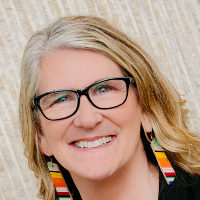
Lore Kinast (she/her)
Lore Kinast is the Director of Strategic Support at NDC and enjoys working with stakeholders on all levels in designing accessible opportunities, implementing systemic benchmarks, and spearheading program development projects. She has 15+ years of experience coordinating interpreting, captioning, and accommodations for deaf students at public universities and community colleges. Lore is the Chair for the Deaf and Hard of Hearing Knowledge and Practice Community with the Association on Higher Education and Disability (AHEAD). She received her EdD in Higher Education Administration.
 18 October, 2023 10:10 am
18 October, 2023 10:10 am
Navigating the College Experience; Real Stories from Deaf College Students
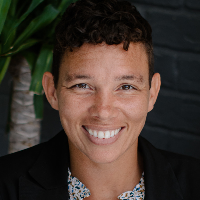
Malibu Barron (she/her)
Malibu Barron is a Deaf Multiracial Ciswoman who is currently a second-year doctoral student under School Improvement at Texas State University. She is known to focus on integrating multiple issues (i.e., education, mental health, DEI-A, community works) to address current needs of our society. Malibu has worked with several Deaf schools, non-profit agencies, and provided her expertise working with universities and organizations hosting different spaces for courageous conversations. She is a Strategic Support Specialist with the National Deaf Center and a proud mom to three Deaf children.
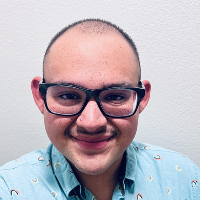
Saul Pineda Orellena (he/him)
I’m Saul, an undergrad at Texas State University, majoring in History and Education with a minor in Psychology. My true passion lies in becoming a teacher and making a positive impact on the education of future deaf students. Let us work together to create a brighter future for them!

Chloe Duarte

Eugene King
Understanding deaf students’ experiences is critical for colleges to create an inclusive climate where they can engage fully. This entails ensuring accessibility, fostering inclusivity, and promoting belonging. The college experience for deaf students include connections with peers and instructors, participation in campus activities, access to accommodations that are effective, and the ability to receive services for self-care. A student panel will share their experiences to help colleges with improving the campus climate for deaf students.
 18 October, 2023 11:30 am
18 October, 2023 11:30 am
Preparing Students for Successful Employment
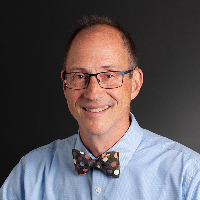
John Macko (he/him/his)
John R. Macko is director of the Co-op and Career Center at Rochester Institute of Technology’s (RIT) National Technical Institute for the Deaf (NTID). In this capacity, he is responsible for developing and enhancing employment opportunities for deaf students and graduates of RIT. During his 30-year career at RIT, he has taught job search classes, been an employment advisor for students seeking co-ops and permanent jobs, and appeared as an expert guest on radio, TV, and Webinar programs. Mr. Macko is a member of the National Association of Colleges and Employers, holds a bachelor’s degree in Finance and a master’s degree in Human Resources, both from Rochester Institute of Technology.
Deaf students and disability professionals both face challenges when working together to prepare students for successful employment. Are you aware of challenges deaf students face when seeking employment? Do you know successful strategies that can be used to help students find jobs? Do you know best practices for how student affairs, career services, disability/accessibility services, and other college professionals can work together? If you answered no to any of these questions, join this session! Attendees will learn how the NTID Co-op and Career Center works with students, faculty, and employers. Additionally, resources for colleges to support deaf students in achieving their career aspirations will be shared.
 18 October, 2023 11:30 am
18 October, 2023 11:30 am
Shifting Practices and Rethinking How We Coordinate Deaf Services

Tia Ivanko
(she/her)
Tia Ivanko, M.S.,NIC, ADAC, the Co-Director and Co-principal investigator at the National Deaf Center on Postsecondary Outcomes, is committed to improving systems and increasing the professional capacity of people and entities who provide services for deaf communities. As a certified ADA Coordinator (ADAC), and nationally certified interpreter (NIC), she brings a deep knowledge of accessibility and professional practices from the interpreting field to the technical assistance work. Ivanko is passionate about addressing inequities in education for deaf learners, she is an experienced trainer and mentor to professionals working in education settings. She is particularly interested in increasing opportunities and representation of Black and Brown professionals in fields serving deaf communities.
In most cases, institutions strive to fulfill their legal responsibilities by providing accommodations for deaf students. However, in practice, this approach results in reactive decision-making, subpar access experiences, and transactional relationships with students. While meeting legal and institutional responsibilities is the minimum, true equity demands a higher standard in theory and in practice. This session is an opportunity to examine current accessibility practices and explore a holistic view of accommodation processes essential to ensuring equitable experiences for deaf students. Participants will gain insight into strategies for transforming practices and embracing equity-centered principles at their institution.
 18 October, 2023 01:00 pm
18 October, 2023 01:00 pm
Automated Craptioning - Wh@T dead Dey say?
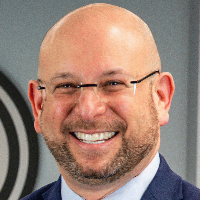
Howard Rosenblum (he/him)
Howard A. Rosenblum is the Chief Executive Officer of the National Association of the Deaf (NAD). He also serves as the Legal Director, and works closely with the NAD lawyers on policy advocacy and litigation work. He has been instrumental in significant legal victories such as: NAD v. Netflix, NAD v. Harvard, NAD v. MIT, NAD v. Trump, and Perez v. Sturgis Public Schools. Mr. Rosenblum has been a lawyer for over thirty years, including: twelve years at the NAD; nine years as a Senior Attorney at Equip for Equality, a nonprofit organization in Illinois; and ten years with a private law firm. He currently serves as the legal advisor to the World Federation of the Deaf. In 2010 and again in 2014, he was appointed by President Obama to serve on the U.S. Access Board. Mr. Rosenblum received his law degree from IIT Chicago-Kent College of Law (1992), and his Bachelor of Science degree in Computer Engineering from the University of Arizona (1988).
AI is taking over the world, and we all know it. What does the law say about the use of automated captioning in universities and colleges? This webinar will focus on different standards and metrics that govern captioning and accessibility.
 18 October, 2023 01:45 pm
18 October, 2023 01:45 pm
Organizational Spotlight: Collegiate Black Deaf Student Leadership Institute (CBDSLI)

Marcus Sylvester
 18 October, 2023 02:00 pm
18 October, 2023 02:00 pm
Topic Discussions: Coordinating Deaf Services

Roberto Santiago

Benjamin Suits-Baer (he/him)
Benjamin is an Accessibility Resource Specialist with NDC. After working in disability services in higher education, he provides technical assistance to colleagues working with deaf students to ensure they can access their college education. He is particularly interested in topics surrounding ADA law, self-advocacy, and equitable experiences. He received his master’s degree in Higher Education and Student Affairs Administration with an emphasis on student affairs professionals and their knowledge of students with disabilities
 18 October, 2023 02:00 pm
18 October, 2023 02:00 pm
Topic Discussions: Career Services

Lore Kinast (she/her)
Lore Kinast is the Director of Strategic Support at NDC and enjoys working with stakeholders on all levels in designing accessible opportunities, implementing systemic benchmarks, and spearheading program development projects. She has 15+ years of experience coordinating interpreting, captioning, and accommodations for deaf students at public universities and community colleges. Lore is the Chair for the Deaf and Hard of Hearing Knowledge and Practice Community with the Association on Higher Education and Disability (AHEAD). She received her EdD in Higher Education Administration.

Liann Osborne
 18 October, 2023 03:15 pm
18 October, 2023 03:15 pm
Equitable Access to Online Learning Courses for Deaf Students
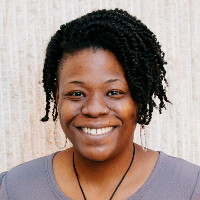
Latoya Dixon (she/her)
Latoya Dixon is an Accessibility Resource Specialist with NDC. She has worked with disability services in higher education and is a seasoned accessibility advocate for transition-age youth and college students with disabilities. Latoya received her M.A. in Vocational Rehabilitation Counseling and is pursuing her doctorate in Deaf Studies/Deaf Education with a focus on the Americans with Disabilities Act (ADA) and the underlying disparities within the deaf community.
Today’s fast-paced and rapidly evolving digital world has led to the rise of online learning as an essential aspect of higher education institutions. This shift has brought about unparalleled accessibility and flexibility for students worldwide. However, ensuring that these opportunities are equally accessible to all learners, including those who are deaf, presents unique challenges and calls for a sense of shared responsibility. This session aims to shed light on the critical importance of inclusivity in the virtual learning landscape with a focus on understanding the experiences of deaf students and creating an accessible virtual environment that benefits all students.
 18 October, 2023 03:15 pm
18 October, 2023 03:15 pm
Re-Framing the Interactive Process to Achieve Effective Communication Access
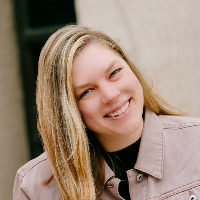
Kate Lewandowski (she/her)
Kate Lewandowski (she/her), M.S., has over 12 years of experience advising and coordinating access for deaf students in the postsecondary environment. Kate’s passion on topics of disability justice, access, and inclusion is a deeply personal endeavor which stems from her experiences navigating systems from when she was a deaf student. Kate earned her master’s in Disability Services in Higher Education.
For the majority of students who seek accommodations through postsecondary disability services offices, the process of receiving accommodations is typically straightforward: 1) submit a request, 2) have an initial meeting, and 3) receive the necessary accommodations. However, when it comes to ensuring access for deaf students, institutions have a greater responsibility to provide effective communication across all aspects of campus life. In order to achieve this, disability services professionals must delve deeper into the interactive process and adopt a student-centered approach. This session aims to explore how disability service professionals can reframe their current accommodation processes through an equity lens when working with deaf students.
 19 October, 2023 10:00 am
19 October, 2023 10:00 am
Opening Remarks

Lore Kinast (she/her)
Lore Kinast is the Director of Strategic Support at NDC and enjoys working with stakeholders on all levels in designing accessible opportunities, implementing systemic benchmarks, and spearheading program development projects. She has 15+ years of experience coordinating interpreting, captioning, and accommodations for deaf students at public universities and community colleges. Lore is the Chair for the Deaf and Hard of Hearing Knowledge and Practice Community with the Association on Higher Education and Disability (AHEAD). She received her EdD in Higher Education Administration.
 19 October, 2023 10:10 am
19 October, 2023 10:10 am
Organizational Spotlight: DREAM/NSCCD

Wendy Harbour
 19 October, 2023 10:30 am
19 October, 2023 10:30 am
Pathways To and Through Health Science Education for Deaf Professionals
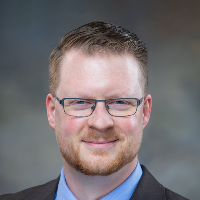
Chris Moreland (he/him)
Christopher Moreland, MD MPH, is a professor of internal medicine and interim chief of the division of hospital medicine at Dell Medical School. As a nationally recognized clinician educator, his innovation and leadership roles have spanned the continuum from pre-professional and medical student to resident and faculty development, including his decade-long role as associate residency director. His nationally collaborative advocacy and research efforts have resulted in multiple peer-reviewed publications and presentations elucidating the experiences of our healthcare workforce of professionals with disabilities, as well as policies and practices to best support their inclusion and retention.
Deaf healthcare professionals are under-represented in the healthcare workforce, yet increasing in number over the last decade. This presentation reviews new research from the last several years on this growing workforce segment and provides insight into how to optimize their education climate for career success.
 19 October, 2023 10:30 am
19 October, 2023 10:30 am
Exploring Assistive Technology Options for Deaf Students
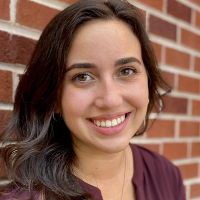
Nicole Genser (she/her)
Nicole Genser is an audiology doctoral student at Montclair State University. She has engaged in multiple educational and advocacy-based initiatives related to promoting equal access for deaf individuals. Being deaf and a hearing-aid user herself, she is motivated towards fusing her academic, work, and personal experiences to help close substantial gaps in these areas. Her clinical and research interests relate to exploring developments in the field of audiology, and higher education, particular to working with teens and young adults with hearing loss.
Assistive technology has revolutionized the way deaf people access information. This session will introduce a diverse range of assistive technologies used by deaf students in different capacities on college campuses. Participants can expect to become familiar with assistive listening systems, speech-to-text services, and apps commonly used by deaf students. Discover how incorporating assistive technology can create a more inclusive environment, fostering engagement opportunities and collaboration among students, staff, and faculty.
 19 October, 2023 11:30 am
19 October, 2023 11:30 am
Preventing ReTraumatization: Establishing Responsive Mental Health Support for Deaf Students

Malibu Barron (she/her)
Malibu Barron is a Deaf Multiracial Ciswoman who is currently a second-year doctoral student under School Improvement at Texas State University. She is known to focus on integrating multiple issues (i.e., education, mental health, DEI-A, community works) to address current needs of our society. Malibu has worked with several Deaf schools, non-profit agencies, and provided her expertise working with universities and organizations hosting different spaces for courageous conversations. She is a Strategic Support Specialist with the National Deaf Center and a proud mom to three Deaf children.
Deaf college students experience a range of barriers when navigating college systems to access academic and non-academic environments. There are challenges with the process to request interpreters, a lack of opportunities to socialize with their peers outside of scheduled class time, and challenges with building connections with faculty and staff. Facing these barriers can trigger trauma and impact the mental health of deaf students. This session offers strategies to be responsive to the needs of deaf students to decrease institutional barriers and support the development of deaf students’ resiliency.
 19 October, 2023 11:30 am
19 October, 2023 11:30 am
Using Data to Further Dialog for Change

Lore Kinast (she/her)
Lore Kinast is the Director of Strategic Support at NDC and enjoys working with stakeholders on all levels in designing accessible opportunities, implementing systemic benchmarks, and spearheading program development projects. She has 15+ years of experience coordinating interpreting, captioning, and accommodations for deaf students at public universities and community colleges. Lore is the Chair for the Deaf and Hard of Hearing Knowledge and Practice Community with the Association on Higher Education and Disability (AHEAD). She received her EdD in Higher Education Administration.
Data and dialog are two essential tools for addressing inequities within the college environment. Data provides insights into the present climate and serves as a catalyst for initiating dialog aimed at systemic transformation. In 2023, NDC gathered data from 1) deaf students regarding their college experiences and 2) disability services professionals about their service provision. This session will provide more insight to the data and strategies for participants to engage in dialog focused on using data to transform systems at their college.
 19 October, 2023 01:00 pm
19 October, 2023 01:00 pm
HIPAA and Access
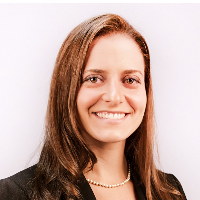
Anna Bitencourt (she/her)
Anna Bitencourt is a senior attorney at the National Association of the Deaf (NAD) serving as a litigator and as director of legal intake. As a litigator, she focuses primarily on civil rights litigation and administrative advocacy on behalf of deaf and hard of hearing individuals to enforce federal antidiscrimination laws including the Americans with Disabilities Act (ADA) and the Rehabilitation Act. As director of legal intake, she oversees responses to inquiries from consumers seeking legal or advocacy assistance from the NAD. Anna holds a J.D. from the Catholic University of America Columbus School of Law and a B.S. in biological sciences from the University of Maryland, College Park.
HIPAA is an important law that protects everyone's privacy in medical care. So why are some universities using HIPAA to deny communication access? This session will discuss misunderstandings that have led to denial of access, and how to remedy such confusion for everyone's benefit.
 19 October, 2023 01:45 pm
19 October, 2023 01:45 pm
Organizational Spotlight: Association of Medical Professionals with Hearing Losses (AMPHL)

Shazia Siddiqi
 19 October, 2023 02:00 pm
19 October, 2023 02:00 pm
Topic Discussions: Health Sciences

Kate Lewandowski (she/her)
Kate Lewandowski (she/her), M.S., has over 12 years of experience advising and coordinating access for deaf students in the postsecondary environment. Kate’s passion on topics of disability justice, access, and inclusion is a deeply personal endeavor which stems from her experiences navigating systems from when she was a deaf student. Kate earned her master’s in Disability Services in Higher Education.

Alicia Booth
 19 October, 2023 02:00 pm
19 October, 2023 02:00 pm
Topic Discussions: Online/Remote Services

Lore Kinast (she/her)
Lore Kinast is the Director of Strategic Support at NDC and enjoys working with stakeholders on all levels in designing accessible opportunities, implementing systemic benchmarks, and spearheading program development projects. She has 15+ years of experience coordinating interpreting, captioning, and accommodations for deaf students at public universities and community colleges. Lore is the Chair for the Deaf and Hard of Hearing Knowledge and Practice Community with the Association on Higher Education and Disability (AHEAD). She received her EdD in Higher Education Administration.

Latoya Dixon
 19 October, 2023 03:15 pm
19 October, 2023 03:15 pm
Discontinuing Intersectional Erasure: Exploring Personal Bias When Supporting Deaf Students
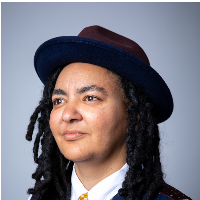
Rezenet Moges-Riedel (she/hers)
Dr. Rezenet Moges-Riedel is a tenure-track Assistant Professor in ASL Linguistics and Deaf Cultures (ASLD) program at California State University, Long Beach. Her current works are heavily shaped by critical race theory, which influenced her concepts "White Oralism" and "Black Deaf Gain". Her recent work is based on intersectional experiences and retention of Deaf Faculty of Color, working at postsecondary institutions. Her research interests also encompass linguistic anthropological issues, such as sign language contact, demissionization, and female masculinity signing styles. Moges(-Riedel) has several articles and book-chapters published by University of California Press, Oxford University Press and Gallaudet University Press.
What does accessibility in higher education mean with an intersectional lens? This inquiry presents an opportunity to have a glimpse of a hundred types of biases and to explore the differences between one’s identities and social labels. The importance of self-reflection is emphatically weighed with one’s biases, identities, and abilities. In order to serve others, one needs to re-evaluate one’s own biases, and this process can alleviate what one calls "intersectional erasure."
